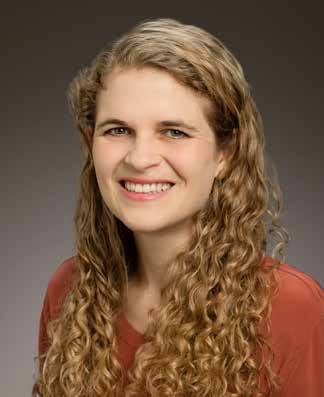Public Engagement
Our mission extends beyond our classrooms and campus. We make a difference in people’s lives locally, nationally, and globally through invigorating outreach informed by our commitment to community and rigorous research culture
Emily Stone has been named the College of Education’s inaugural Director of Public Engagement
 Emily Stone has hit the ground running as she heads the College’s efforts in engaging with faculty across campus and with community collaborators. The College of Education, says Emily Stone, has always been a leader in public engagement, both on campus and beyond. “Previously, though, there hasn’t been a central point person to support areas that have growth potential and to guide this work and connect collaborators who don’t necessarily know about each other and who could help each other elevate and expand their work,” says Stone.
Emily Stone has hit the ground running as she heads the College’s efforts in engaging with faculty across campus and with community collaborators. The College of Education, says Emily Stone, has always been a leader in public engagement, both on campus and beyond. “Previously, though, there hasn’t been a central point person to support areas that have growth potential and to guide this work and connect collaborators who don’t necessarily know about each other and who could help each other elevate and expand their work,” says Stone.
Now, campus and community collaborators have that central point person in Stone, who was named the College’s first director of public engagement. “Dean James Anderson has a lot of passion in this area, as do I,” says Stone, who has a Master’s in Public Health. “We want to help the College have a visible and significant societal impact. There’s so much potential when you combine academic collaborators with their expertise and passion with the boots-on-the-ground people, the community collaborators who have the pulse of the community and understand the issues. When you can get those teams to work together, there’s this huge potential for impact and that’s why this area is so exciting.
"This position will support faculty and staff working in community engaged research and public engagement, as well as provide undergraduate and graduate students with opportunities to connect their studies to real-world problems."
Helping Middle Schoolers Become Global Citizens
 The launch of the College of Education’s I-Global program was a complete success for all 195 participants—middle school students from 11 countries, preservice teachers, and graduate students.
The launch of the College of Education’s I-Global program was a complete success for all 195 participants—middle school students from 11 countries, preservice teachers, and graduate students.
Cultural sharing and understanding is at the heart of I-Global, which is designed to help middle schoolers from around the world become global citizens and to give preservice teachers the opportunity to teach students from various cultures. The curriculum is based on the United Nations’ Sustainable Development Goals. Students work on projects within their own group, then share online with I-Global students from other countries.
"The overall shared global experience and letting young people show us their plans for the future was absolutely inspiring. I think the experience opened their eyes to a bigger world, and also to their own personal goals. They will hopefully make decisions going forward that will benefit not only themselves, but the rest of the world, because they’ve started thinking about things on this global citizenship level.” — Janine Soldberg, veteran teacher and EPOL doctoral student
New Initiative Brings Asian American Authors to Schools
 In a virtual visit to University Primary School in May, a Chinese American author read from her latest picture book and shared how she grappled with feeling different growing up in a small Ohio town.
In a virtual visit to University Primary School in May, a Chinese American author read from her latest picture book and shared how she grappled with feeling different growing up in a small Ohio town.
“I had fun as a kid, but I also remember feeling like I didn’t belong,” Andrea Wang said, showing a picture of her second-grade yearbook.
“I’m the only Chinese American kid in my whole class and actually in my whole grade.”
Wang said that being unique is “a wonderful thing, but sometimes it doesn’t feel that way. Sometimes what makes you different can feel like a bad thing, and I wanted to write about those feelings, to show kids that you’re not the only one who feels like that.”
The visit was part of a new Asian American Education Initiative organized by the University of Illinois College of Education and the UI’s Center for East Asian and Pacific Studies.
The initiative aims to increase teaching about Asian American history and bring more Asian American literature into classrooms. College of Education Associate Director of International Programs Wei Liu said she and her colleagues were initially inspired by Asian American book drives that have popped up recently across the U.S.
"As educators, we noticed an absence of Asian American history in the curriculum for K-12 schools, and we think and we believe one of the reasons we were having … racial discrimination and bias against Asian Americans is because we’re not teaching about Asian American history in schools." — Wei Lui
“Many Americans don’t know this history, and Asian Americans themselves do not know their own history.”
The initiative’s first steps began with a talk on Asian American history and virtual to local schools by three Asian American authors.
In addition to developing an Asian American history curriculum, Liu said the initiative hopes to continue the author talks next school year.
Early Childhood Education Consortium Plan by Pacione-Zayas Signed into Law

A wide-ranging new plan to bolster the early childhood education workforce in Illinois by creating a new Early Childhood Education Consortium was signed into law Wednesday, the result of legislation championed by College of Education alumna State Senator Cristina Pacione-Zayas, Ed.M. EPOL '03, Ph.D. EPOL '09 (D-Chicago).
“To truly provide Illinois children with the best possible education, we know that we need to invest in early childhood education, and that means investing in the educators who work so hard to help them learn and grow,” Pacione-Zayas said. “This is a step toward properly valuing those who do this incredibly important work, and it’s the beginning of a new chapter in our approach to raising our kids.”
The Early Childhood Education Consortium will be a broad coalition between all public universities and community colleges, as well as any private institutions that choose to participate within Illinois. The consortium will use regional hubs to improve access to degrees, certificates, and other licensure for early childhood educators, with special priority given to those already working in the early childhood workforce and often need flexibility in their career education when it comes to scheduling, location and format.